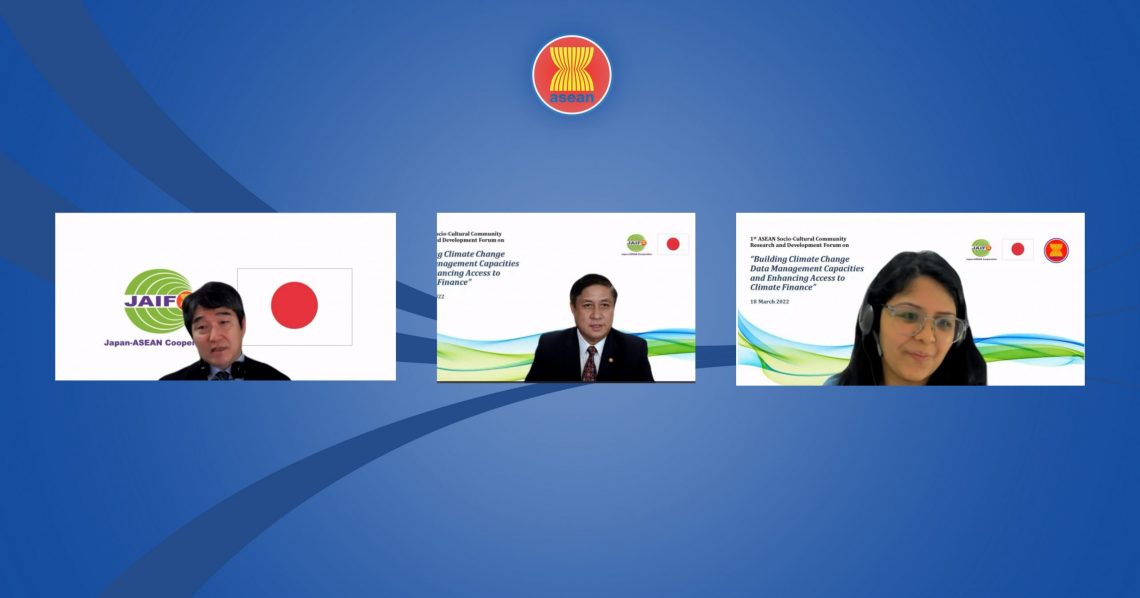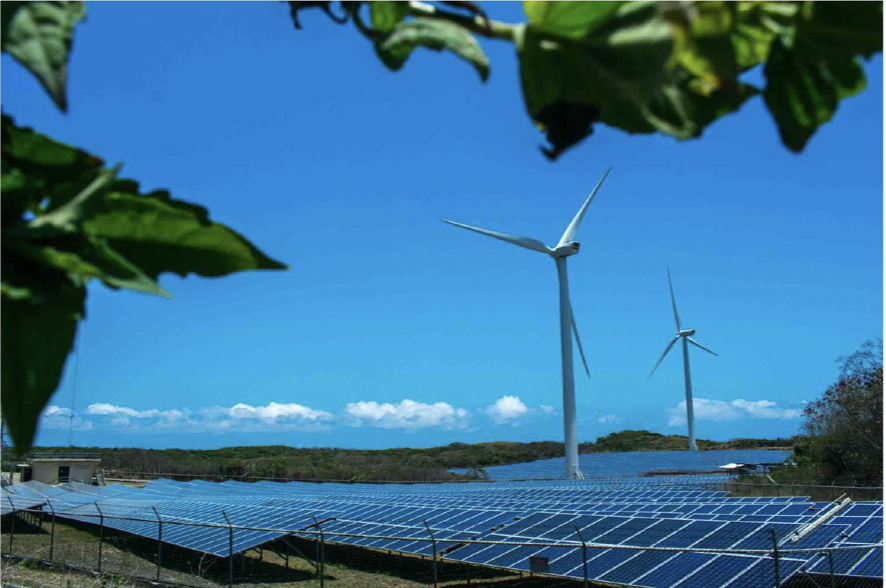Data Capacities and Access to Finance Key for ASEAN Climate Action

 |
The vulnerability to and impact of climate change caused by greenhouse gas emissions is a major concern to ASEAN to sustain its economic growth, reduce vulnerabilities and conserve the environment. The projected global warming due to emissions is likely to trigger serious consequences for humankind and other life forms including a rise in sea levels, which will endanger coastal areas and small islands, and a greater frequency and severity of extreme weather events.
Climate change is about more than extreme weather. There are socio-economic dimensions of a changing climate that are important determinants of whether ASEAN can tackle poverty, develop clean cities, and continue to deliver improvements in quality of life, as stipulated in the ASCC Blueprint 2025. There are many interlinkages between poverty, economic development and climate change; therefore, holistic approaches are required to address the current and future challenges that result from a changing climate.
At the global level, the United Nations Framework Convention on Climate Change (UNFCCC) provides a framework amongst its member countries to take actions on climate change mitigation (reducing emissions) and adaptation (increasing resilience). The Paris Agreement, an agreement under the UNFCCC which came into force in 2015 at the 21st Session of the Conference of the Parties (COP-21), encourages each country to submit Intended Nationally Determined Contributions (INDCs) that provide countries the flexibility to propose nationally appropriate climate change mitigation and adaptation efforts and implementation plans. Climate Change also features as an important United Nations Sustainable Development Goal. Goal 13 (Climate Change) highlights the need to take urgent action to combat climate change and its impacts.
As major sources of greenhouse gases, cities across the ASEAN region need to urgently seek low-carbon economies, infrastructure and transport. ASEAN has played an active and leadership role in addressing climate change in the global community. ASEAN has issued Declarations and Statements related to climate change, which express ASEAN’s common understanding, position and aspirations towards a global solution to the challenge of climate change and their resolve to achieve an ASEAN community resilient to climate change through national and regional actions.
ASEAN Member States have taken actions to address climate change through various environmental, economic and social activities over the years. Several ASEAN Member States have announced intended national mitigation targets spread across sectors, including LULUCF (Land-use, land-use change and forestry), renewable energy, transport, hydropower, agriculture and waste, which will contribute towards low-carbon economies. Many ASEAN Member States have also started strengthening their adaptive capacity through mainstreaming climate change adaptation in development planning.
While a country’s INDCs would largely determine where the largest reductions could be made, coherence across policies, technology transfer, funding for climate change and conducive trade agreements are required to translate the INDCs into action. ASPEN provides a forward-looking plan to promote cooperation and joint actions across ASEAN Member States that would allow for sustainably addressing the sources and impacts of climate change. Efforts under this Strategic Priority will focus on five programmatic areas: (i) adaptation and resilience, (ii) mitigation, (iii) technology transfer, (iv) climate finance, and (v) cross-sectoral coordination and global partnerships.
ASEAN Joint Statements on Climate Change serve the purpose of articulating ASEAN's common position during negotiations at the Conference of the Parties (COPs) to the UNFCCC. These statements are adopted by ASEAN Leaders during the annual ASEAN Summits. Starting in 2007, there have been thirteen ASEAN Joint Statements or Declarations on Climate Change shared at the UNFCCC COPs, with statements issued in 2007, 2009, 2010, 2011, 2014 and every subsequent year until 2022.
ASEAN Member States have supported other initiatives specific to peatlands and control of air pollution. For instance, the programme on the Sustainable Use of Peatland and Haze Mitigation in ASEAN (SUPA; 2016-2019), a joint ASEAN-EU initiative, is focusing on improving sustainable peatland management, managing risks of forest fires and reducing transboundary haze in ASEAN, and consequently mitigating the adverse impacts of climate change.
Dialogue and development partners have identified ASEAN as an important unit for regional collaboration and integration and have tailored projects to address common issues in the region, such as SEAN-CC, GIZ ASEAN Forestry Project, and GIZ supported Transport and Climate Change Project.
Over the next 10 years, the main objectives of the AWGCC Action Plan are:
To enhance regional and international cooperation to address climate change and its impacts on socio-economic development, health and the environment in ASEAN Member States through supporting mitigation, adaptation, technology transfer, capacity building, finance, cross sectoral coordination and global partnerships;
To contribute actively to the climate related global frameworks, such as the Paris Agreement under the UNFCCC, and Agenda 2020 for Sustainable Development and Sustainable Development Goals;
To coordinate activities within ASEAN Member States on climate change to share best practices and lessons learned as well as to facilitate access to climate finance.
ASEAN Working Group on Climate Change (AWGCC) will be the main responsible body for the implementation of the programmes and activities of this Strategic Priority Area. AWGCC serves the key purpose of (i) establishing linkages with the UNFCCC and finding common grounds or understanding for negotiation within UNFCCC; and (ii) coordinating activities within ASEAN Member States on climate change. Other relevant sectoral bodies and/or partners will be consulted for cross-sectoral and cross-pillar activities.
The AWGCC will oversee the implementation of activities under this Strategic Priority, while the ASEAN Environment Ministers and the ASEAN Senior Officials on Environment will provide policy and strategic guidance for its work. Lead countries of each programme/activity under the strategic priority are expected to develop proposal of detailed implementation workplan, implement the activity in coordination with AMS and ASEC, and provide regular progress updates to AWGCC.
The activities under this Strategic Priority could be implemented through partnerships and regional collaborations with Dialogue / Development Partners and organisations working actively on climate change. Potential partners or platforms include Climate Change International Training Center (CITC), United Nations Development Programme (UNDP), United Nations Programme on Reducing Deforestation and Forest Degradation (UNREDD), United Nations Environment Programme (UN Environment), Conservation International, and Center for People and Forests (RECOFTC). The Asian Development Bank (ADB) is actively working in the Greater Mekong Sub-region, including with some of ASEAN Member States, therefore providing potential space for collaboration with AWGCC.
Activities could also be implemented through cooperation and support from Dialogue/Development partners, for example, Deutsche Gesellschaft für Internationale Zusammenarbeit (GIZ), India (ASEAN-India Green Fund), China, Republic of Korea’s support on Low-Carbon Green Growth Initiative and US Agency for International Development (USAID), as well as through multilateral cooperation, such as the European Union (EU) and the Green Climate Fund (GCF) and their accredited institutions in ASEAN Member States.
Credits: ASEAN Foundation Photo Competition - Amihan's Haven "Emergence of Wind and Solar Power" (2021)